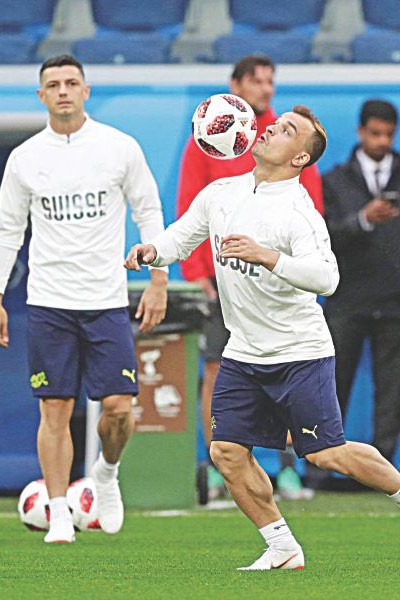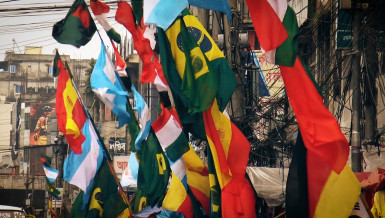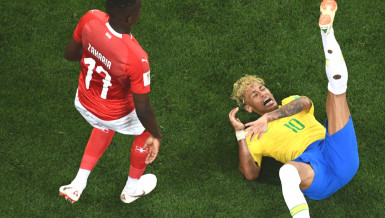Switzerland have made headlines in Russia for their players' controversial goal celebrations but the team stands on the verge of matching their best-ever run at a World Cup.
If Vladimir Petkovic's side beat Sweden in Saint Petersburg on Tuesday, they will become the first Swiss team in 64 years to qualify for the quarter-finals of football's biggest tournament.
Although they have largely gone under the radar in Russia -- double-eagle scoring celebrations against Serbia aside against -- the unheralded team are enjoying an impressive tournament.
Marshalled by skipper Stephan Lichtsteiner, driven by Valon Behrami's energy, and able to call on Xherdan Shaqiri's creativity, Switzerland emerged from a tricky Group E that included tournament favourites Brazil.
They are unbeaten in Russia, have scored in every game and a defeat against Portugal last October is the only blemish in an impressive run of results over the past two years.
Add in impressive goalkeeper Yann Sommer, who writes a gourmet food blog when not playing international football, and Switzerland are becoming a formidable unit.
"We want more and more," Petkovic said after his team made the last 16.
"We are used to making history, we have big ambitions and the next big ambition is to beat Sweden."
The last time Switzerland reached the quarter-finals of the World Cup, in 1954, they were hosts and the 16-team tournament was a very different beast -- they lost their last-eight clash to Austria 7-5 after being three up early on.
But as they look to match or even better that showing, there is a significant cloud on the horizon for the Sweden match.
Switzerland's defence have excelled so far but will be without key defenders Lichtsteiner and Fabian Schaer against Sweden after both picked up two yellow cards in the group stage.
Between them, Arsenal new boy Lichtsteiner and Schaer have played more than 150 times for the country.
Lichtsteiner was one of three players who escaped with a fine -- Shaqiri and Arsenal's Granit Xhaka were the others -- after their politically motivated celebrations in the 2-1 win against Serbia.
They celebrated goals with a pro-Kosovo double-eagle gesture.
The double-eagle symbol represents the Albanian flag and is viewed as a symbol of defiance in Kosovo, which declared independence in 2008 in a move that Serbia still refuses to recognise.
Potential replacements for the Sweden game include another player with an Arsenal connection, Johan Djourou, and Sommer's Borussia Moenchengladbach colleague, Michael Lang.
Switzerland and Sweden have not met since 2002 so there are recent no indications of who could have the edge on Tuesday.
Although the last-16 match is one of the least glamorous of the first knockout phase, it provides a good opportunity to qualify for the last eight in the "weaker side" of the draw, and for Switzerland to re-write their World Cup history.




 For all latest news, follow The Daily Star's Google News channel.
For all latest news, follow The Daily Star's Google News channel. 










Leave your comments